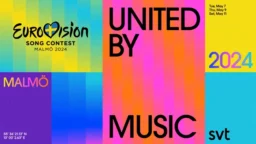Sometimes a Eurovision song aligns so beautifully with the life of the person who sings it. Sometimes you just need to go through the lyrics line by line because the story lends itself to it. Stay by Monika Linkytė is the perfect example. Monika represents Lithuania for the second time at the Eurovision Song Contest, but the contrast between her two entries couldn’t be bigger. From a saccharine Eurovision kiss to an ancient Lithuanian saying.
The first verse
In 1992, Monika is born. She grows up in Gargždai, a small town not far from the Lithuanian coast.
I’ve carried sadness with me,
I hid it well since sixteen.
(from Stay)
A few weeks before Monika’s second birthday, in 1994, her country participates in the Contest for the very first time. Lithuania grows up stumbling in the early years after the Soviet Union, the early years on the Eurovision stage. Monika grows along with it. Her grandmother has been singing her whole life. Her mother is a music teacher. Monika is uncertain about many aspects for her life, but about this she is: she wants to make music. And one day she will represent her country on that stage.
A struggle
And all the crying all the fighting
It kept putting out the fire
That burned so bright within me
For a long time, it seems to be a struggle: a stable and secured future, or a career in music? At fifteen, Monika tries to reach the Junior Eurovision Song Contest, but she fails in the Lithuanian final. She finishes high school and starts studying at the University of Vilnius. Health Sciences. She stays for three semesters, then she quits.
2010, 2011, 2012, 2013, 2014
As I look back to all these years
To broken dreams disguising fear
Being someone that I’m really not
What doesn’t stop is the music. Monika writes her own songs and collaborates with other musicians. She participates in the Lithuanian preselection for five times in a row. Every year, she doesn’t make it. After that fifth defeat, she re-enrols at the university. Law, this time. Again, she drops out after a few months. ‘I wanted to live according to what others thought was sensible for me; I shaped myself according to how they saw me, according to what they wanted to make of me. But it never worked.’
The last chance
She wants to try one more time. Monika signs up again for the Lithuanian national Eurovision final. Again, she appears to fall short, but then a question arises: would she like to sing a love song as a duo with singer Vaidas in the final? Monika hesitates but feels it’s her last chance to achieve her ultimate goal. In preparation for the performance with Vaidas, the stage director proposes that they create something people won’t quickly forget: how about they passionately kiss each other halfway through the song?
The kiss
The rest is history: three months later, they perform This time at the stage of the Eurovision Song Contest of 2015. The kiss is still there, lasts even longer, and now has two mirror images: at the same time, the two female backing vocalists and the two male ones are also kissing. Monika and Vaidas qualify for the final. Her dream has come true.
Or has it? Because something doesn’t feel right. After all those failed attempts, did she indeed make it to the Song Contest because of her singing abilities? Each interview prior to the festival is mostly about the kiss. And in each interview, Vaidas takes the lead, supposedly because he speaks better English. Monika is there, she keeps smiling, stays professional, continues to perform. This time finishes eighteenth in the final.
The second verse
I took it all on myself
I asked for nobody’s help
There must have been offers. Tempting opportunities for quick fame and success; perhaps they should continue as a duo, more saccharine love songs and meanwhile perpetuating the myth of the kiss. But Monika goes solo. Her debut album achieves a platinum status later that year; she wins Lithuania’s most prestigious music award for ‘Best Album’, ‘Best Song’, and ‘Best Female Act’.
Gone
Had to taste it
And embrace it
All the bitterness of failure
To find myself within me
And in 2016, a year after her Eurovision participation and her musical breakthrough, Monika takes another unexpected decision. She leaves. She leaves behind success and fame and starts a new course of study. No Health sciences this time, nor Law, but: Music Education. In London. Who researches the things artist Monika Linkytė, who tried so hard for so many years, has been doing from that point onward, won’t find much. But in London, Monika does find something: herself.
Open mic
Now, seven years later, she sings again for Lithuania, this time at the Eurovision Song Contest of 2023. It all started with a joke. Her singing coach in London, with whom she had become good friends, took her to an open mic night at her favourite pub. ‘I met her friends, one of them was a massive Eurovision fan. Nicola, I said, should I just participate in the Lithuanian pre-selection this year? Because if I win, I can get you a ticket for the Song Contest in Liverpool! She thought I was joking, but I noticed a switch flipped in my head. I had three weeks to write and record the song. But I already knew what it had to be about.’
Nicola is now one of her backing singers. That says it all: Monika’s participation at Eurovision is completely different from that of eight years ago. No longer in the shadow of others, but surrounded by friends. No longer someone else’s song, but her own. And no longer someone else’s saccharine love message, but her own honest story.
Just stay with me
My heart is bleeding
I need your healing
The chorus
Perhaps the most beautiful contrast in Monika Linkytė’s performance is this: as sad and sometimes desperate as the chorus may seem, she sings it out loud, enjoying every second, every high note. Because this is who she is, with all the mistakes she made, with all the loneliness she must have felt.
Wait for me
Well it ain’t easy
To love someone like me
Čiūto tūto
Two Lithuanian words echo again and again in the otherwise entirely English text: Čiūto tūto. This cannot be translated exactly, as it’s an expression that comes straight from Lithuanian folk music. It can mean: ‘It’s too hard’, but also ‘It sounds too loud’. And both translations fit nicely with what Monika sings immediately after that line:
Finally my heart is beating
‘This song is about becoming whole again. Recovering from pain. It’s my personal story, but I believe it could just as well apply to all of Europe: isn’t the world in general yearning for healing, for recovery? ‘Čiūto tūto’ is a kind of magic spell that invites you to return to yourself, to listen to yourself and to live from your heart.’
And with the repeated utterance of those enchanting words, Stay ends. Life is sometimes too hard, too heavy, my heart beats sometimes too hard, too loud. But thank God it beats. Finally, it beats.
Foto: Reda Mickeviciute / Eurovision.tv






